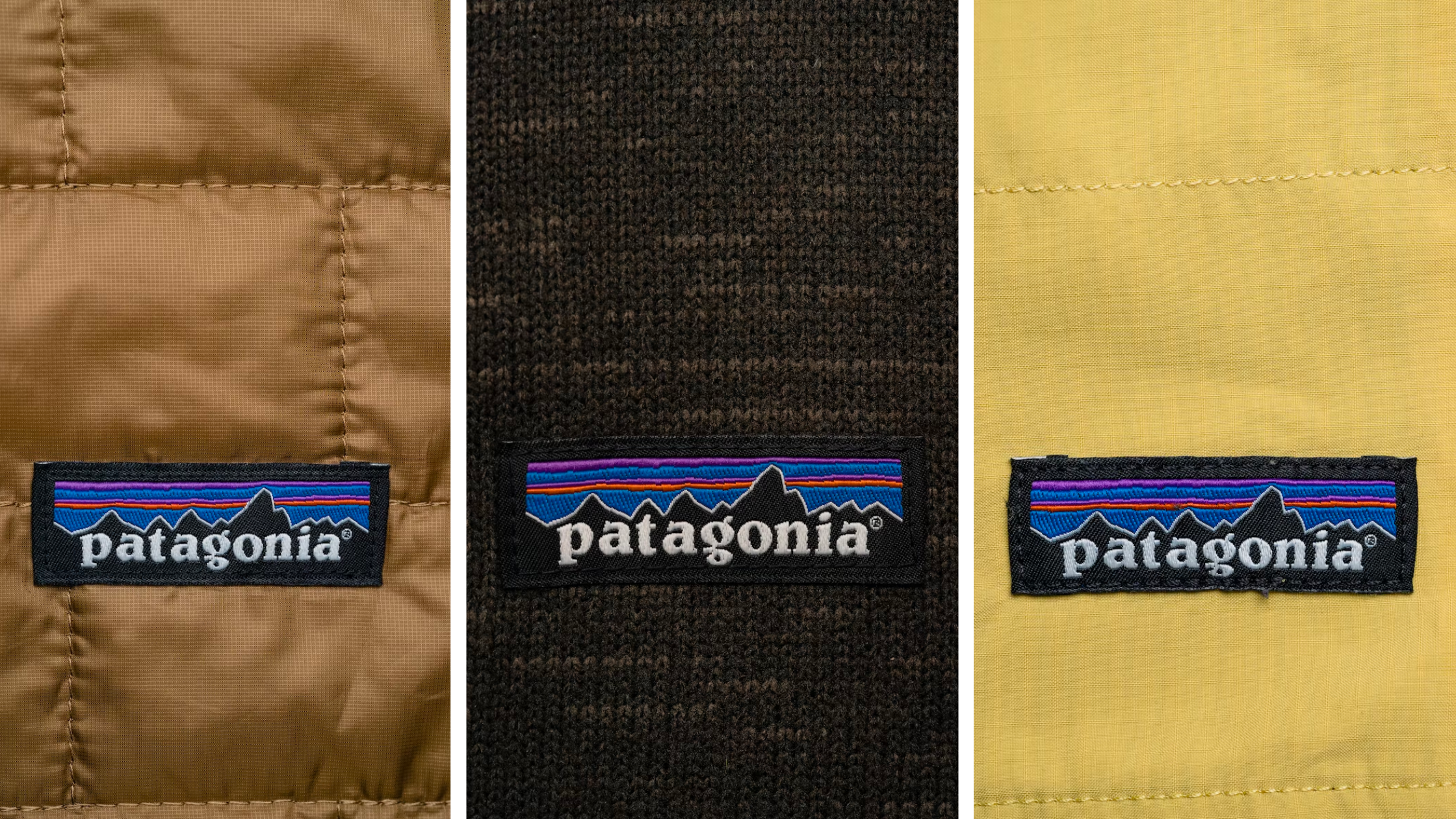Patagonia is an outdoor clothing brand based in California, founded by American rock climber Yvon Chouinard in 1973. In contrast to the many fast fashion companies using sustainability as a PR stunt, Patagonia takes its philanthropic advocacy seriously. As one of the certified B corporations since 2012, Patagonia has been dedicated to climate change, environmental justice, and nature protection. Each year, Patagonia donates 1% of its total sales to protect and preserve nature since 1985, known as “One Percent for the Planet.” In 2021, the company took a step further in sustainability by ditching all additional corporate branding or logos as it “reduces the life span of a garment.”
Within the Chinese market landscape, Patagonia owns four direct-sale stores in the country as of October 2022. The outdoor clothing brand targets nature enthusiasts and environmentally conscious consumers in mainly first-tier and newly first-tier cities, along with several authorized dealerships and e-commerce stores to reach consumers from lower-tier cities.
Earth is now our only shareholder
In September 2022, the founder of Patagonia hit the global headlines by announcing that the privately-owned company, worth 3 billion dollars (approximately 21 billion RMB), is donated to fight climate change. In Yvon Chouinard’s words, “Earth is now our only shareholder.” Any profit that goes beyond the reinvestment of the business will be used by the Patagonia Purpose Trust and the Holdfast collective to fight the environmental crisis, according to the newly updated ownership page of the company website.
Patagonia advocates consumers to “Don’t buy this jacket”
A decade ago, during the Black Friday season amid a shopping frenzy in 2011, Patagonia released its “Don’t buy this jacket” campaign in the New York Times, which was supposed to send a conscientious message to remind consumers of the importance of shopping consciously and responsibly. As anti-consumerism as this campaign might sound, Patagonia’s sales shockingly went up by 40% in the following two years after the release of the campaign.
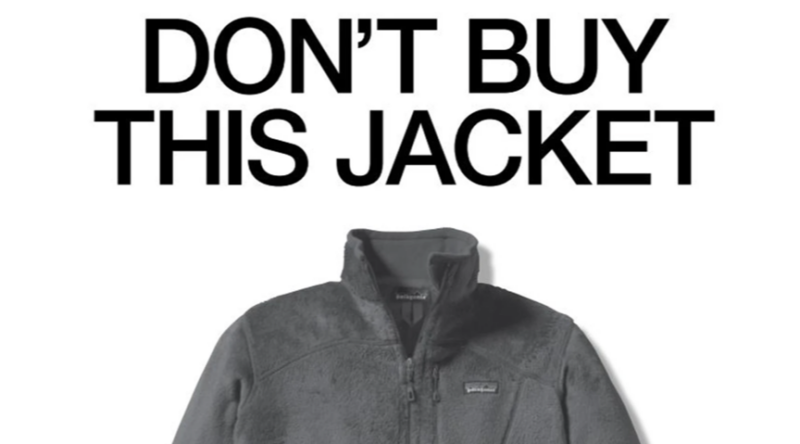
Patagonia’s anti-consumerism strategies persist in China
With four direct stores in China and an official e-commerce store on Tmall, the eco-friendly brand is still clinging to its “anti-consumerism” strategy in the world’s largest e-commerce market. According to an interview with Patagonia’s general agent in China “Lao Zeng,” the company has barely participated in large shopping festivals such as “Single’s Day.” Despite the fact that Patagonia chose to keep its distance from sales and discounts, the official flagship store during 2011’s “Single’s Day” season still reached nearly 3 million RMB in sales.
During the 618 Festival in 2021, a surprising message was sent out through Patagonia’s official WeChat account: “NO SALE”- where the sustainable brand once again endorsed its “anti-consumerism” strategy along with educating customers on the environmental impact of their purchase decisions. This campaign struck Chinese consumers as a breath of fresh air amid the frenzy of a shopping festival by calling upon shoppers to “Buy less and Demand more.”
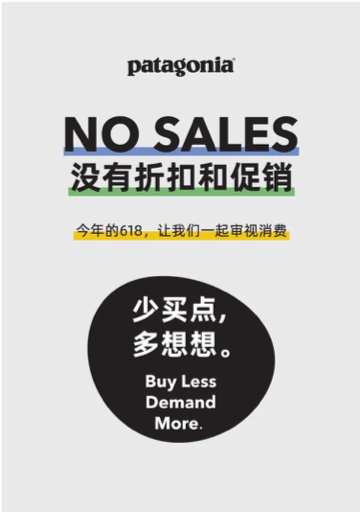
Patagonia’s official Weibo account also frequently shares content regarding its brand story and tips on how to practice sustainability. The eco-friendly brand’s community events are particularly favored by Chinese netizens. Under a post in which Patagonia shared the pictures taken during its “hiking trail cleanup project” in Nanjing, some ardent netizens asked in the comment section “whether it would be held in Beijing.” Another netizen even volunteered to be an organizer for such events in Chengdu.
On the offline side, Patagonia has been partnering with shopping malls to educate Chinese consumers on its “Don’t buy” philosophy. In 2020, Patagonia held an education exhibition themed “The Stories We Wear” in K11 Shanghai, whose parent company New World Development Hong Kong is also devoted to sustainability.
Patagonia’s informative yet insightful marketing strategies demonstrate that educational-based campaigns can successfully target Chinese audiences, rather than greenwashing. According to Vogue Business Index, sustainability has become more prevalent among Chinese consumers, especially post-pandemic. But even pre-Covid times, Chinese consumers were highly aware of the environmental impact produced by industries, compared to the rest of the world, as they are concerned about environmental pollution that directly affects their health. By urging its “anti-consumerism” philosophy, Patagonia also showcased living proof that profitability and sustainability are not necessarily mutually exclusive.
What Chinese netizens think of Patagonia’s 3-billion-dollar donation
Unquestionably, the selling of the company has caught the attention of the world and also sparked new discussions on Chinese social media. Searches on Baidu of “Patagonia” spiked after the announcement of Patagonia founder’s billion-dollar donations to save the earth.
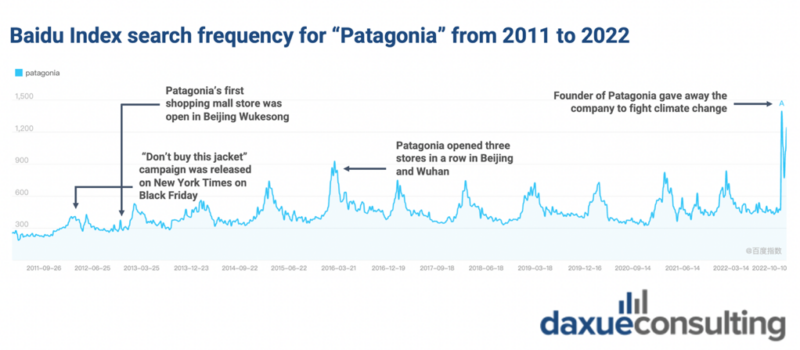
On Chinese social media Weibo, the hashtag #Founder of Patagonia donated the whole company# (巴塔哥尼亚创始人捐赠整个公司) was viewed over 715,000 times as of October 2022. Chen Yijia (陈一佳), who is the host for Reuters and also a finance commentator said on her Weibo account, “Full of respect for Patagonia, the boss donated the entire company to the earth. Well, in a sense, the earth does own everything we have.”
“Seeing that Patagonia’s founder’s family donated the entire company to ensure that the company would continue to donate profits to environmental protection every year after the founder’s death, I clicked on the brand’s website and bought a few second-hand clothes.” A Chinese netizen said. Under this post, more netizens also commented that they were going to purchase a few pieces of Patagonia’s clothing.
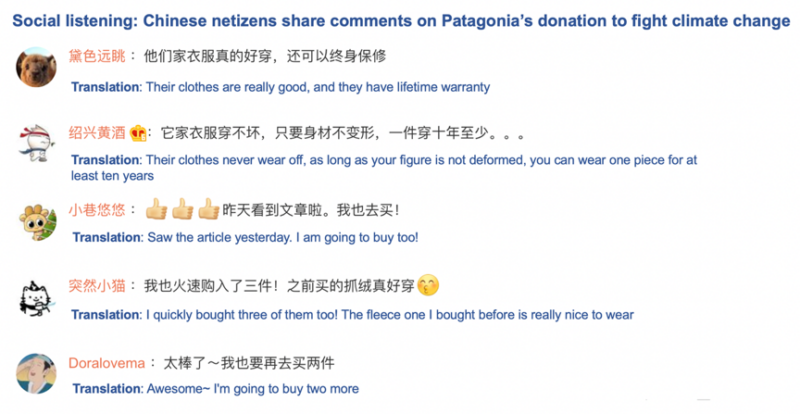
Recommendations from Chinese environmental enthusiast “Zero-waster”
On Bilibili (哔哩哔哩), a Chinese video-sharing platform, zero-waster “A bag”(壹个袋子) made a video on sustainable clothing brands in which she mainly introduced Patagonia to her audience and explained the various efforts Patagonia has been making in order to reduce carbon footprint and eventually achieve “carbon neutral” by 2060. In the video, she also showed three second-hand pieces she recently bought from Patagonia.
“I can feel this brand genuinely wants to carry out the concept of sustainability throughout (the brand),” the zero-waster said. In the comment section under this video, a Bilibili user shared the authorized Patagonia online stores in China for people who might be interested in the brand after watching this video.

The future of sustainable fashion driven by younger Chinese consumers
As environmental sustainability becomes an indispensable element in China’s society, according to daxue consulting’s Green Guilt Report, this advocacy has been pushed further by Chinese consumers’ growing demand for greener products over recent years. Although fast fashion still dominates the clothing industry in China, around 40% of the younger respondents are open to buying second-hand clothing, a growing market in the nation, especially with second-hand luxury. In addition, almost all income groups are inclined to pay more for sustainable clothing products, notably the younger generation. According to our survey, 88% of Millennials and 89% of Gen Zs are willing to pay at least 5% extra for greener fashion products.
What brands can learn from Patagonia’s green initiatives
As consumers are increasingly aware of the environmental impact of their purchasing behaviors, more and more brands are attempting to incorporate sustainability into their brand image. Spending a portion of the company’s revenue on recycling, using clean energy, and adopting green materials could seem to add extra costs in the short run. However, it is not impossible for profitability and sustainability to coexist at the same time. For a brand like Patagonia that has been dedicated to the cause since the very beginning, it might do the contrary. The company is also setting an epitome that an educational-focused approach appears to be the most feasible marketing strategy to promote environmental sustainability to Chinese consumers.


